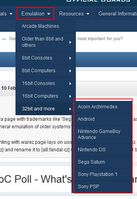It's very viable. But it seems the Ed us the only person who really wants to use an soc this way. Everybody else is creating tablets. The only interesting thing I would say is the shield but it doesn't have Linux and isn't x86 so it's mostly uninteresting as well. Arm was really good when it was the only option for low power computing. But it isn't any more.
Maybe thats because, as i said, its a niche platform... The sheild runs linux. Insofar as its more comparable than the failed windows running x86 clamshells of yester year. linux|gnu and android is on every other gaming handheld. Maybe with the omission of the razer thing, that got canceled → X86, windows, mass market, sounds familiar? Im going to say you are partly right, because even Mips (gcw-zero) is more of a goto solution in the real world. If you want x86 devices, go to the last vendors that are alive, they have enough trouble selling laptops at the price it commands. No small company survives in x86, x86 has _nothing_ in small form factor, much less a viable future plan, and if it did, going there is a huge risk, for which there is no tangible reward seeing as dragonbox is a small linux|gnu vendor.
Furthermore, game-centric handheld clamshells isnt generic because it isnt.
Everyone else _wants_ tablets, afaik as evident by this poll, ARM is the arch people want for their niche device, and these are the demographic that makes up the userbase for said niche segment of the market. The diamentrally opposite stance to how that is viable, isnt viable.
TL;DR: wintel is subsidizing the x86 mobile dream for now, but its not happening. If its anything that is more mainstream now as opposed to when pandora came to be, its the platform its built on. Steady growth with less risk makes sense.


